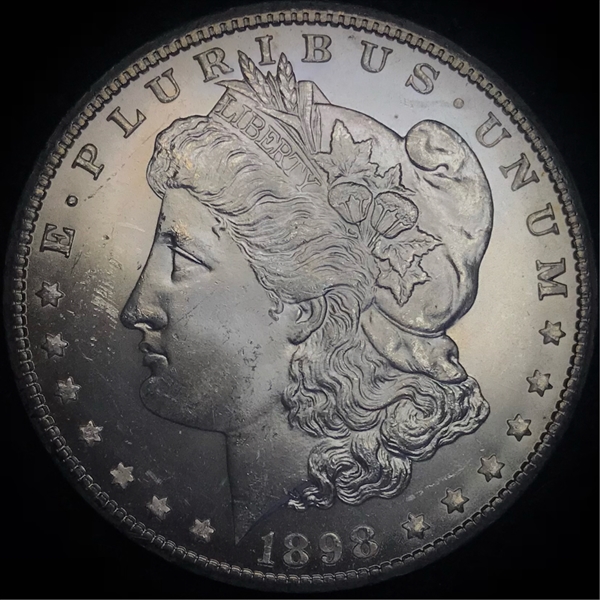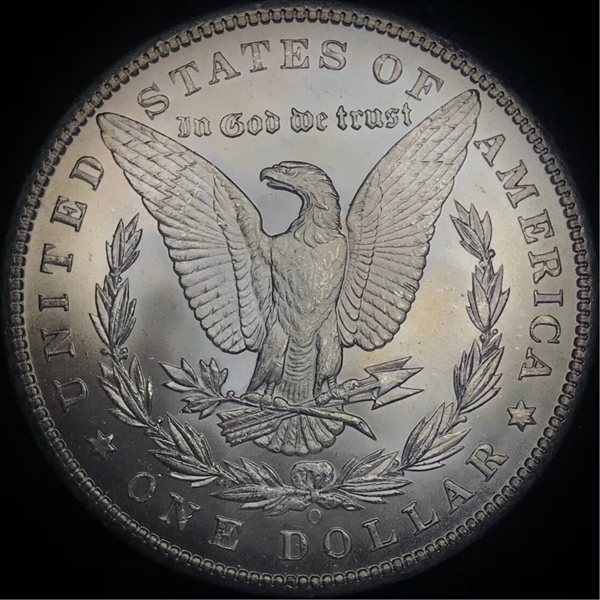1898-O $1 MS63+ PCGS号7254
拥有者评论
Raw Choice Unc. MS63 or MS64. Bought for $52.
专家评论
Q. David Bowers
The following narrative, with minor editing, is from my "Silver Dollars & Trade Dollars of the United States: A Complete Encyclopedia" (Wolfeboro, NH: Bowers and Merena Galleries, Inc., 1993)Numismatic Information
Hoard coins: If you had been a collector of Uncirculated Morgan dollars in September 1962, high on your want list would have been the 1898-O, along with the 1903-O, and 1904-O. These three were the most formidable rarities among Mint State New Orleans dollars, and even the most in-depth dealer's stock was not likely to have an example of anyone of the three. If you could have found one, it would have set you back $300 to $400 or more. The current Guide Book listed the value at $300, or double the price of the 1889-CC. A bag of 1,000 coins, if such existed, would have had a theoretical market value of over $300,000! But, not to worry. None was to be had, although a few bags had come out of storage in the Treasury Building in Washington, D.C. in the 1940s and early 1950s and, except for a few hundred pieces that went into dealers' stocks, the coins had slipped into circulation.
In October 1962, the rarity status of the 1898-O and certain other key issues changed, and with it changed the face of American numismatics. From deep within the vaults of the Philadelphia Mint, where millions of New Orleans dollars had been stored since they were moved there in 1929, came a cascade of bright, sparkling 1898-O dollars, along with 1903-O, 1904-O, and other dates. Distributed through the Federal Reserve System, some of these 1898-O dollars were released in Michigan; perhaps the first ones were. Before long, they were coming out in many places. How the mighty had fallen, and within a few months a bag of 1,000 1898-O dollars was worth not $300,000, but in the $1,200 range!
How many bags of 1898-O dollars were released?
The answer is not known, but it was at least many hundreds, if not a thousand or more-the latter amounting to one million or more coins. All of the sudden, the public became fascinated with Morgan silver dollars. Collectors who had ignored the series earlier, became interested. The rest is history.
For closely related commentary, see 1903-O and 1904-O listings. In my opinion, a display featuring 1898-O, 1903-O, and 1904-O dollars together with some old-time advertisements and listings, accompanied by information about the 1962-1964 Treasury release, would attract a lot of attention at a convention.
A rarity in hiding: Although by hindsight we all know that the 1898-O was considered to be rare in the early 1960s, it is interesting to note that numismatists of earlier generations were not as well informed. Nearly every leading collection of Morgan dollar mintmarks formed from the late nineteenth century through the mid-1930s lacked a Mint State 1898-O. Many lacked an 1898-O in any grade. It was supposed that the issue was common, but, somehow, not available. On the infrequent occasions when a specimen crossed the auction block, such as in B. Max Mehl's sale of the Griffith Collection, February 29,1916, the price was apt to be cheap, in that instance just $1.25.
Circulated grades: In worn grades the 1898-O is rare, but Mint State coins are so common that circulated coins have been driven down to common-date values. Thomas B. Phillips, a Tennessee dealer, considered the 1898-O the rarest of all Morgan dollars in circulated grades and thought it to be more elusive than 1889-CC, 1892-S, 1893-S, or other more famous dates. Others suggest that in worn grades it may be third rarest, after 1885-CC (rarest) and 1903-O.
Mint State grades: Following the release of large quantities of Mint State coins in October 1962, the 1898-O became common. Before that, Mint State coins were rarities. Today, specimens can be found in all Mint State grades. I propose these population estimates: MS-60 to 62, 300,000 to 600,000; MS-63, 175,000 to 275,000; MS-64, 200,000 to 300,000; and MS-65 or better, 45,000 to 80,000.
Prooflike coins: Prooflike coins are common, in view of the large supply of regular Mint State coins. DMPL coins are somewhat scarcer. In 1977, Wayne Miller found 150 cameo DMPL pieces in a bag of 1,000 prooflike coins. The "Proof' advertised by B.M. Douglas (The Numismatist 12/51) was probably a DMPL.
Die rotation: One variety has the reverse die rotated 15° from the normal alignment.
Varieties
Circulation strikes:
1. Normal date: Breen-5654. Various positional varieties exist. Probably not all 30 pairs of dies were used.
Dies prepared: Obverse: Unknown; Reverse: Unknown.
Circulation strike mintage: 4,440,000; Delivery figures by month: January: none; February: none; March: none; April: none; May: 500,000; June: 600,000; July: 210,000; August: 750,000; September: 30,000; October: 1,000,000; November: 450,000; December: 900,000.
Estimated quantity melted: Probably the majority of the mintage, for relatively few were placed into circulation; perhaps 3,000,000 or more were melted.
Availability of prooflike coins: Very common; many thousands survive. DMPL coins are scarcer but thousands exist.
Characteristics of striking: Striking varies from sharp to weak, depending upon the coin.
Known hoards of Mint State coins: Many bags of 1,000 coins were released by the Treasury beginning in November 1962, after which the 1898-O, previously considered to be very rare in Mint State, became common.
Commentary
Prior to October 1962, the 1898-O was one of the most famous of all Morgan silver dollars and was considered to be a great rarity. Later, quantities were released by the Treasury, and the 1898-O became common.
Additional Information
Distribution of Dollars
The Annual Report of the Director of the Mint, 1898, told of dollar distribution during the fiscal year:
New Orleans: In mint July 1, 1897, 16,686,000; coinage, fiscal year 1898, 2,124,000; total, 18,810,000; transferred from the mint to the Treasury, 16,950,000; in mint July 1, 1898, 1,139,000; total, 18,089,000; distributed from mint, 721,000.
PCGS #
7254
设计师
George T. Morgan
边缘
Reeded
直径
38.10 毫米
重量
26.73 克
铸币数量
4440000
金属成分
90% Silver, 10% Copper
更高评级数量
56801
评级较低的钱币数量
3492
地区
The United States of America
价格指南
PCGS 数量报告
拍卖 - PCGS 评级的
拍卖 - NGC 评级的
稀有性和存量估计 了解更多
| 所有评级 | 444000 |
| 60或以上 | 100000 |
| 65或以上 | 47000 |
| 所有评级 | R-1.6 |
| 60或以上 | R-2.0 |
| 65或以上 | R-2.5 |
| 所有评级 | 65 / 117 TIE |
| 60或以上 | 65 / 117 TIE |
| 65或以上 | 105 / 117 TIE |
| 所有评级 | 65 / 117 TIE |
| 60或以上 | 65 / 117 TIE |
| 65或以上 | 105 / 117 TIE |


























